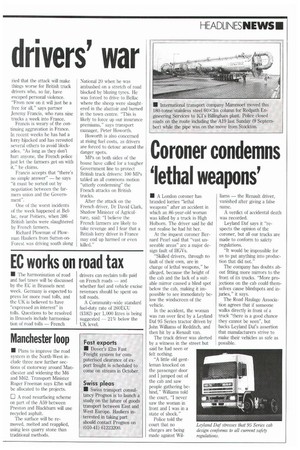Coroner condemns 'lethal weapons'
Page 7

If you've noticed an error in this article please click here to report it so we can fix it.
• A London coroner has branded lorries "lethal weapons" after an accident in which an 86-year-old woman was killed by a truck in High Holborn. The driver said he did not realise he had hit her.
At the inquest coroner Bernard Pearl said that "vast unseeable areas" are a major design fault of HGVs.
"Skilled drivers, through no fault of their own, are in charge of lethal weapons," he alleged, because the height of the cab and the lack of a suitable mirror caused a blind spot below the cab, making it impossible to see immediately below the windscreen of the vehicle.
In the accident, the woman was run over first by a Leyland Daf 95 Series tractor driven by John Williams of Redditch, and then hit by a Renault van.
"A little old gentleman knocked on the passenger door and I jumped out of the cab and saw people gathering be: hind," Williams told the court, "I never saw the woman in front and 1 was in a state of shock."
Police told the court that no charges are being made against Wil liams — the Renault driver, vanished after giving a false name.
A verdict of accidental death was recorded.
Leyland Daf says it "respects the opinion of the coroner, but all our trucks are made to conform to safety regulations.
"It would be impossible for us to put anything into production that did not.'' The company has doubts about fitting more mirrors to the front of its trucks. "More projections on the cab could themselves cause blindspots and injuries," it says.
The Road Haulage Association agrees that if someone walks directly in front of a truck "there is a good chance they cannot be seen", but backs Leyland Dal's assertion that manufacturers strive to make their vehicles as safe as possible.




































































































